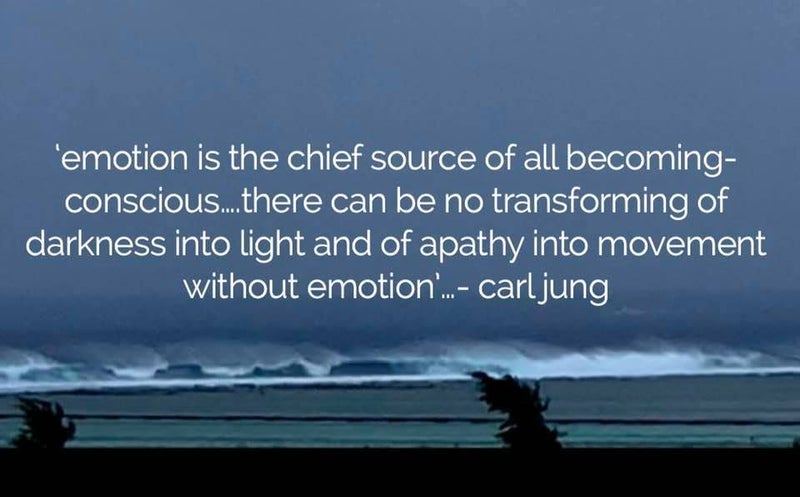情動
affect
emotion (情動)と同義語であり,神経興奮や他の明らかな精神運動性障害 を引き起こすほどに強烈な感情(feeling) である。感情(feeling) は制御可能だが,情動は意志に反して侵入してくるので, 抑圧できるとしても困難である。情動 (affect)の爆発は個人に襲いかかり, 一時的に自我に取ってかわる。
情動 (emotions) は,われわれに降りかかる。情動 (affect) は,適応がもっとも不十分な部分で生じるとともに, 不適応の根拠をさらけだしてくれる。 この仮説が,言語連想検査を用いたユ ングの初期の実験の中核をなしている。 コンプレックス発見の鍵となるのは, 「情動を担った反応である。情動は,心理的な価値の所在場所と強さを明らか にする。こころの傷がどの程度か測る基準は、その傷に触れられたとき引き起こされる情動である(連想)。ユング心理学辞典(創元社)p76
affect
affect (日本語からの機械翻訳です。)
emotion is a synonym for emotion, an affect that is so intense that it causes neural excitation or other obvious psychomotor disturbances. Feeling are controllable, but they are difficult, if at all, to suppress because they invade against the will. Emotional outbursts strike the individual and temporarily replace the ego.
Emotions fall on us. They occur in areas where adaptation is at best inadequate, and they expose the basis for maladaptation. This hypothesis is at the heart of Yung's early experiments with verbal association tests. The key to complex detection is "emotionally charged responses. Emotions reveal the location and strength of psychological values. The measure of the extent of a psychological wound is the emotion evoked when the wound is touched (association).
Jungian Dictionary of Psychology (Sogensha) p76
Emotion
"情動はしばしば感情と混同されるが、これはすべて間違いである。
情動は不随意であるのに対し、感情は価値ある機能であり、情動においてあなたは常に犠牲者である。~カール・ユング、1934年5月25日、講演V、109ページ
“Emotions are often confused with feelings but this is all wrong.
Feeling is a valuing function, whereas emotion is involuntary, in affect you are always a victim.” ~Carl Jung, Lecture V 25May1934, Page 109
Feeling
感情Feeling は、知覚できるような身体的な神経支配を生じないという事実によって、情動affect と区別される、すなわち、通常の思考プロセス以上でも以下でもない。~ユング定義、CW 6、par. 725.
Feeling is distinguished from affect by the fact that it produces no perceptible physical innervations, i.e., neither more nor less than an ordinary thinking process. ~Jung Definitions, CW 6, par. 725.
「情動Emotionsとは本能的で不随意な反応であり、その本質的な爆発によって意識の理性的な秩序を揺るがすものである。~カール・ユング、CW 9i, Para 497.
“Emotions are instinctive, involuntary reactions which upset the rational order of consciousness by their elemental outbursts.” ~Carl Jung, CW 9i, Para 497.
私が情動的(emotional )に圧倒されるときはいつでも、正真正銘の情動(affect)が存在する。情動(affect)の状態では全く人間ではなく、無感覚な塊である。
情動(Affects)とは、内側から湧き上がる一種の爆発である。
その結果、情動(emotions )は感情(feeling)とは無関係であり、心理物理的な状態である。~カール・ユング、意識と無意識、ETH講演会、40ページ。
Genuine affect exists whenever I am overwhelmed by an emotional state. You are not at all human in a state of affect, but a senseless mass.
Affects are kinds of explosions that come from the inside.
Consequently, emotions have nothing to do with feeling; they are psycho-physical states. ~Carl Jung, Consciousness and the Unconscious, ETH Lectures, Page 40
https://aquariumofvulcan.blogspot.com/2012/04/cgjung-on-emotion.html
あなたが情動的(emotional)な発言をするときはいつも、あなたが自分自身のことを話しているのではないか、言い換えれば、あなたの情動(emotion)の投影があるのではないか、という疑いがかなりあるのです。つまり、自分の情動(emotion)の投影なのです。そして、あなたは常に、自分が適応していないところに情動(emotion)を持っています。もしあなたが順応していれば、情動(emotion)は必要ありません。情動(emotion)とは、あなたが自分の仕事をこなしていないことを示す、本能的な爆発に過ぎません。ある状況や人にどう対処したらいいかわからないとき、あなたは情動的(emotional)になります。あなたは適応していなかったので、状況について間違った考えを持っていましたし、どんな場合でも正しい手段を使いませんでした。その結果として、ある種の投影が起こりました。例えば、ある人は特に敏感で、もし何か嫌なことを言ったら、その人はこういう風に返してくるだろう、という考えを投影してしまうのです。したがって、あなたは何も言いませんが、彼はそのような反応を示すはずがありません。その代わりに、あなたは情動(emotion)を得るまで待ち、それにもかかわらずそれをぶちまけるのですが、もちろんそれははるかに不快なものです。長く待ちすぎたんだ。もし、あのとき話していれば、何の情動(emotion)も湧かなかったはずです。そして通常、最悪の結果は、その人ではなく、自分自身にもたらされるのです。
なぜなら、あなたは自分の感情(feelings)を傷つけたくないし、自分の声が不快で、辛く、荒々しく聞こえるのを聞きたくないからです。自分はとても優しくて親切だという考えを持ち続けたいのでしょうが、当然それは真実ではありません。だから、投影があると、自分が背負わなければならない重荷が増えるのです。
- C.G.ユング ニーチェの『ツァラトゥストラ』 2: 1494-8
You see, whenever you make an emotional statement, there is a fair suspicion that you are talking about your own case; in other words, that there is a projection of your emotion. And you always have emotions where you are not adapted. If you are adapted you need no emotion; an emotion is only an instinctive explosion which denotes that you have not been up to your task. When you don’t know how to deal with a situation or with people, you get emotional. Since you were not adapted, you had a wrong idea of the situation or at all events you did not use the right means, and there was as a consequence a certain projection. For instance, you project the notion that a certain person is particularly sensitive and if you should say something disagreeable to him he would reply in such-and-such a way. Therefore you say nothing, though he would not have shown such a reaction because that was a projection. You wait instead until you get an emotion, and then you blurt it out nevertheless, and of course then it is far more offensive. You waited too long. If you had spoken at the time, there would have been no emotion. And usually the worst consequences of all are not in that individual but in yourself, because you don’t like to hurt your own feelings, don’t want to hear your own voice sounding disagreeable and harsh and rasping. You want to maintain the idea that you are very nice and kind, which naturally is not true. So sure enough, any projection adds to the weight which you have to carry.
– C.G.Jung Nietzsche’s Zarathustra 2: 1494-8
Translated with www.DeepL.com/Translator (free version)

Emotion is the thing that
carries you away.
You are thrown out of yourself.
- CARL JUNG
情動(Emotion) というのは、
あなたを連れ去ります。
あなたは自分自身から投げ出されます。
- カール・ユング
H
質問 :
あなたは「情動」(emotion)という言葉をどのような意味で使いますか? あなたは、ここで多くの人が「感情」(feeling)という言葉を使うのと同じ意味で「情動」(emotion)という言葉を使いました。 あなたは「情動」(emotion)という言葉に特別な意味を持っていますか?
ユング:
感情emotionという言葉の使用に関しては、通常、大きな間違いや誤解があるため、その質問をしていただいたことをうれしく思います。 当然のことながら、誰もが言葉を自由に使うことができます。
しかし、科学用語では、あなたが何について話しているのかを誰もが理解できるように、特定の区別に固執する必要があります。
私が「感情」(feeling)を価値観の機能として説明したことを覚えているでしょうが、私は感情(feeling)に特別な意味を置いているわけではありません。 私は、感情(feeling)が微分されれば、それは合理的な関数であると考えています。
それが区別されない場合、それはただ起こるだけであり、その場合、それは「不合理」という言葉で要約できるすべての古風な性質を持ちます。しかし、意識的な感情feelingは、価値を識別する合理的な機能です。
情動(emotions)について研究すると、生理的な神経支配を特徴とする状態に「情動的」(emotional)という言葉が当てはまっていることが必ずわかります。 したがって、情動(emotions )を精神的な部分ではなく生理的な部分である程度測定することができます。
私は情動(emotion )を「情動」(affect),と捉えていますが、それは「何かがあなたに情動(affects) を与える」ということと同じです。 それはあなたに何かをし、あなたに干渉します。 情動(Emotion) はあなたを連れ去るものです。 あなたは自分自身から投げ出されます。 まるで爆発があなたを自分から追い出し、自分自身を忘れたかのように、あなたは自分自身から離れています。同時に観察できる非常に具体的な生理学的状態があります。
したがって、違いは次のとおりです。感情(feeling)には物理的または具体的な生理学的症状が現れませんが、情動(emotion) は生理学的状態の変化によって特徴付けられます。
- カール・ユング
H
QUESTION :
In what sense do you use the word "emotion"? You used the word "feeling" rather in the sense in which many people here use the word "emotion." Do you give the term "emotion" a special significance or not?
JUNG :
I am glad you have put that question, because there are usually great mistakes and misunderstandings concerning the use of the word emotion. Naturally everybody is free to use words as he
likes, but in scientific language you are bound to cling to certain distinctions so that everyone knows what you are talking about.
You will remember I explained "feeling" as a function of valuing, and I do not attach any particular significance to feeling. I hold that feeling is a rational function if it is differentiated.
When it is not differentiated it justhappens, and then it has all the archaic qualities which can be summed up by the word "unreasonable."But conscious feeling is a rational function of discriminating values.
If you study emotions you will invariably find that you apply the word "emotional" when it concerns a condition that is characterized by physiological innervations. Therefore you can measure emotions to a certain extent, not their psychic part but the physiological part.
I take emotion as affect, it is the same as "something affects you." It does something to you-it interferes with you. Emotion is the thing that carries you away. You are thrown out of yourself; you are beside yourself as if an explosion had moved you out of yourself and put you beside yourself.There is a quite tangible physiological condition which can be observed at the same time.
So the difference would be this: feeling has no physical or tangible physiological manifestations, while emotion is characterized by an altered physiological condition.
- CARL JUNG

Quiet circles of egocentric ideation are frequently disturbed by strong feeling tones, so called afects.
-CARL JUNG
自己中心的な観念の静かな輪は、いわゆる「情動」(afects)と呼ばれる強い感情( feeling)の調子によってかき乱されることがよくあります。
-カール・ユング
C.G.JUNG著....
感情(feeling)の調子は、身体の神経支配を伴う情動的(afective) な状態です。 自我は、すべての一般的な身体感覚がしっかりと結びついた結合を心理的に表現したものです。
したがって、本来の性格は最も強固で強力な複合体であり、(健康であれば)あらゆる心理的嵐の中でもそれ自体を主張します。 だからこそ、自分の個性に直接関わる考え方が一番安定していて面白いのです。 言い換えれば、彼らは最も強い注意力を持っています。
現実は、自己中心的な観念の静かな輪が、いわゆる「情動」(afects)と呼ばれる強い感情feeling の調子によって頻繁に妨害されることを認識しています。 危険を脅かす状況は、アイデアの静かな遊びを押しのけ、その代わりに、最も強い感情(feeling)の調子を持った他のアイデアの複合体を置きます。 次に、新しい複合体が非常に目立つように表示され、他のすべての複合体が背景に押し込まれます。 それは他のすべての考えを完全に抑制し、その状況に適合する直接的な自己中心的な考えだけを保持します。
特定の条件下では、最も強力な反対の考えを完全に無意識にまで瞬間的に抑制することさえできます。 最も強い注意力を持っています。
- カール・ユング
Written by C.G.JUNG....
The feeling—tone is an afective state which is accompanied by bodily innervations . The ego is the psychological expression for the firmly associated union of all general bodily sensations .
The personality proper is therefore the firmest and strongest complex ,and asserts itself ( provided it be healthy) throughout all psychological storms . It is for that reason that the ideas which directly concern one’s own personality are themost stable and interesting ; in other words they possess the strongest attention - tone .
Reality sees to it that the quiet circles of egocentric ideation are frequently disturbed by strong feeling tones , so called afects. A situation threatening danger pushes aside the tranquil play of ideas and places in its stead a complex of other ideas of the strongest feeling- tone . The new complex then appears very prominently , crowding all the others into the background . It totally inhibits all other ideas , retaining only those direct egocentric ideas which fit its situation .
Under certain conditions it can even momentarily suppress to complete unconsciousness the strongest contrary ideas . It has the strongest attention - tone .
- CARL JUNG
情動(Affect):
身体的症状や思考の障害によって特徴づけられる情動的(Emotional )反応。
情動(Affect )は必ずコンプレックスが活性化したことを示す。
情動(Affects)は通常、適応が最も弱いところで生じると同時に、その弱さの理由、すなわちある種の劣等感や人格の低次元の存在を明らかにする。この低いレベルでは、感情(emotions)をコントロールできないか、あるいは怖くてコントロールできない。... [道徳的判断ができない。
~ シャドウ』、アイオン、CW 9ii, par. 15
Affect:
Emotional reactions marked by physical symtoms and disturbances in thinking.
Affect is invariably a sign that a complex has been activated.
Affects occur usually where adaptation is weakest, and at the same time they reveal the reason for its weakness, namely a certain degree of inferiority and the existence of a lower level of personality. On this lower level with its uncontrolled or scarecely controlled emotions one ... [is] singularly incapable of moral judgment.
~ ["The Shadow", Aion, CW 9ii, par. 15]
「意識が高度の明晰さに達していないとき、そのすべての機能において、意識的意志よりも本能に依存し、理性的判断よりも情動(affect )に支配されているとき」 CW 13, Para 12 そのとき、自分の無意識に慣れていない人は、「情動(affect)の爆発、苛立ち、悪い気分、性的興奮の餌食になり、その結果、意識は徹底的に混乱する」。CW 13, パラ108
" ... when consciousness has not attained any high degree of clarity, when in all its functions it is more dependent on the instincts than the conscious will, more governed by affect than by rational judgment" CW 13, Para 12 then people unfamiliar with their unconscious can fall prey to "outbursts of affect, irritation, bad moods and sexual excitement, as a result of which consciousness gets thoroughly disoriented." CW 13, Para 108
http://synonym.englishresearch.jp/details/feelings.html
(上記は心理学的な解説、下記は一般的な解説)
feelings emotion
「感情」の類義語とその違いを解説します。
feelings一般的な感情
emotion強い感情
feelings
[fíːliŋ]/[U]
「感情」の意味で最も一般的な語です。
喜怒哀楽などの一般的な感情で、理性に対する感情を表します。
emotion よりも穏やかで感覚的なものです。
example
Her feelings are easily wounded.
彼女の感情は傷つきやすい。
emotion
[imóuʃən]/[C][U]
態度に表れた強い「感情」です。
feelings に比べ、態度に表れた抑えることのできないような強い心の動きを表します。
example
He was in the grip of a powerful emotion.
彼は強い感情にとらわれていた。



